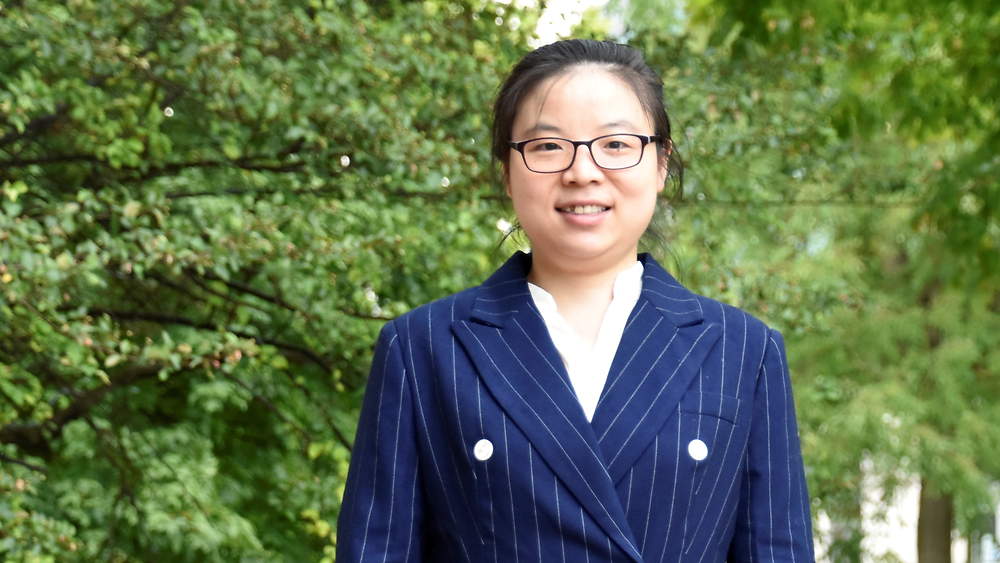February 11, 2022 | News | Interview with Emma Zai
How Public Measures Can Encourage Men and Women to Split Caregiving More Equally

© with courtesy of Emma Zai
The United Nations recognizes the role of women and girls in science as agents of change with the International Day of Women and Girls in Science. Emma Zai, a Researcher at the Max Planck Institute for Demographic Research (MPIDR), analyzes what kind of economic implications there are for women if public policy regulates informal caregiving. In this interview she explains her findings, encourages young women to pursue a career in science, and tells us about her own role model.
Dr. Zai, you do research on subsidies to in-home care. How do they influence informal caregiving work in the US?
Public policy influences informal caregiving behavior. In the US, the Medicaid Aging Waiver provides subsidies to formal in-home care. We found that increasing the amount of money to this program also increases the probability of adults providing in-home care to their parents. It means that public policy can sometimes encourage more informal care.
Is that always a good thing?
Not necessarily. It can be good for older parents who prefer to be cared for by familiar members. However, it also can have negative effects if that care is already burdensome to families, for example cutting work hours and leaving the labor market.
In general, women spend more time on unpaid care work than men. Why is that still true, especially in high income countries?
There are multiple reasons. First, women are historically the main caregivers in the household. There is still a social expectation that women take the main responsibility of informal care, and that is why we see that women account for a larger share of informal caregiving. Second, unfortunately, it is still more economically reasonable for women to provide the care because their opportunity cost is lower compared to men. That means that women earn relatively less than men with the same education and skills. Looking at it from the perspective of benefiting the household, it is an economic advantage for women to take up caregiving responsibilities while men work for money. Third, women often have a stronger preference to care for their loved ones, which means more women than men also enjoy helping their parents. That of course does not mean that some men would not enjoy it.
What are the economic consequences for women doing so much unpaid work?
One consequence is that the wage gap between men and women remains. Also, once the caregiving responsibility is over, it is hard for women to return to the labor force and get equal pay as men. Another societal consequence is that the amount of tax collected may be compromised if women withdraw from the labor force.
… and another?
Well, the quality of care may not be ideal. In fact, sometimes, those who are receiving care get better treatment from professional care providers.
Are there public policy changes that can alter the current situation?
On the one hand, governments should subsidize informal caregivers - and not only for women - based on their level of care and income. It means that informal caregivers can be paid and they can earn some money from it. On the other hand, governments can also provide tax benefits to employers who offer flexible working hours for employees to balance work and care responsibilities.
As for all women, care work for women in science is an issue to contend with. What could be done to support female scientists and their career?
Set up more funding programs for women.
Is there something you want to tell young women who want to start a career in science?
Do not set bars and limit your expectations as women. Women can achieve anything if they desire to. Also, be brave to overcome barriers and work hard to reach the goal since there are still many challenges faced by women.
Do you have a role model?
My mother is my role model. She is hard-working and never gives up. She has a low level of education because of the complicated Chinese history. However, she never gives up learning and has always encouraged her children to pursue their dreams - even those others might consider unrealistic.
About Emma Zai
Emma Zai started working as a research scientist at the Max Planck Institute for Demographic Research (MPIDR) last summer, after finishing her PhD at the Ohio State University in early 2021. She is interested in the economics of aging and health economics. Zai uses large secondary datasets and research designs to estimate the causal effects of public policy on individual behavior and outcomes. Her work is motivated by understanding how government interventions affect individual wellbeing and how individuals respond to public policy.
Upcoming Publications
- The Unintended Effect of Medicaid Aging Waivers on Informal Caregiving (with Yinan Liu)
- The Effect of Medicaid Home and Community-Based Services on Health (with Yinan Liu)
- The Unintended Consequences of Partnership Long-Term Care Program on Labor Force Participation (with Yinan Liu)
About the International Day of Women and Girls in Science
The United Nations is celebrating this year’s International Day of Women and Girls in Science as a virtual event from the UN Headquarters in New York.